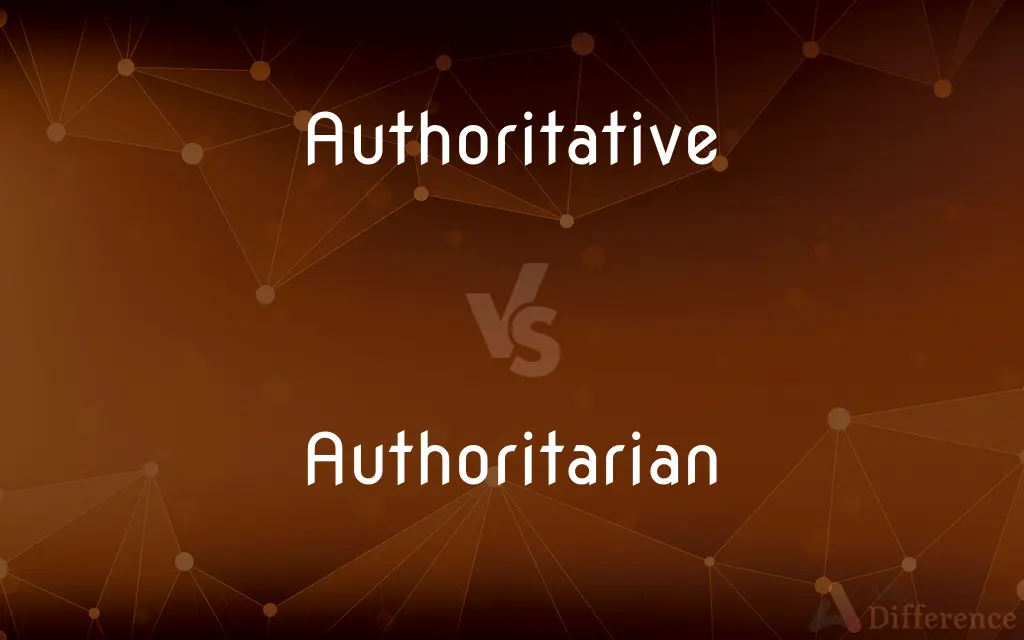Authoritative vs. Authoritarian — What's the Difference?
By Fiza Rafique & Maham Liaqat — Updated on March 14, 2024
Authoritative implies respected and knowledgeable leadership, while authoritarian denotes strict, controlling governance without input from others.

Difference Between Authoritative and Authoritarian
Table of Contents
ADVERTISEMENT
Key Differences
Authoritative leadership is characterized by confidence and competence, often earning respect and voluntary follow-through from others. It balances firmness with fairness, guiding with expertise and empathy. Conversely, authoritarian leadership is marked by strict control and a top-down approach, often lacking regard for individual freedom or input. It relies on obedience and enforces discipline, sometimes at the cost of personal autonomy.
While authoritative figures are seen as role models or mentors, offering guidance and support, authoritarian figures are often viewed as dictators who demand compliance without question. The former is built on respect and trust, the latter on fear and submission.
The key distinction lies in communication and decision-making: authoritative leaders engage in dialogue and consider others' perspectives, whereas authoritarian leaders dictate terms with little to no negotiation. This difference significantly impacts the climate of the environments they lead.
In essence, the authoritative approach is about empowering and educating, fostering a sense of autonomy and mutual respect. Authoritarianism, however, centers on control and obedience, often leading to a stifling atmosphere that discourages open communication and individuality.
Comparison Chart
Leadership Style
Confident, knowledgeable, and respectful
Strict, controlling, and demanding
ADVERTISEMENT
Decision Making
Collaborative with consideration for others
Top-down with little to no input from others
Communication
Open, encouraging dialogue and feedback
Limited, often one-way communication
Relationship Basis
Respect and trust
Fear and submission
Impact on Followers
Empowerment and growth
Obedience and conformity
Compare with Definitions
Authoritative
Commanding and self-confident; likely to be respected and obeyed.
She has an authoritative presence in meetings.
Authoritarian
Favoring or enforcing strict obedience to authority at the expense of personal freedom.
The company's authoritarian management style stifled creativity.
Authoritative
Able to be trusted as being accurate or true; reliable.
This book is an authoritative source on ancient history.
Authoritarian
Characterized by or favoring absolute obedience to authority.
His authoritarian parenting discouraged any form of questioning.
Authoritative
Based on competent authority; convincing.
His suggestions were authoritative and well-received.
Authoritarian
Of or relating to a governmental or political system, principle, or practice in which individual freedom is held as completely subordinate to the power of authority.
Authoritarian regimes often suppress dissent.
Authoritative
Exhibiting the weight of authority; official.
The report was issued with an authoritative tone.
Authoritarian
Exercising complete or almost complete control over the will of others; dictatorial.
The leader's authoritarian rule was marked by fear and repression.
Authoritative
Exercising authority; commanding.
Her authoritative approach in leadership is admired by her team.
Authoritarian
Expecting or requiring people to obey rules or laws without any input or questioning.
Her authoritarian approach to teaching made students reluctant to express their ideas.
Authoritative
Able to be trusted as being accurate or true; reliable
An authoritative source
Clear, authoritative information and advice
Authoritarian
Favouring or enforcing strict obedience to authority at the expense of personal freedom
The transition from an authoritarian to a democratic regime
Authoritative
Commanding and self-confident; likely to be respected and obeyed
His voice was calm and authoritative
Authoritarian
An authoritarian person.
Authoritative
Having or arising from authority; official
An authoritative decree.
Authoritative sources.
Authoritarian
Characterized by or favoring absolute obedience to authority, as against individual freedom
An authoritarian regime.
Authoritative
Of acknowledged accuracy or excellence; highly reliable
An authoritative account of the revolution.
Authoritarian
Tending to tell other people what to do in a peremptory or arrogant manner.
Authoritative
Demonstrating authority; commanding
The captain's authoritative manner.
Authoritarian
Of, or relating to, or exhibiting strict obedience to an authority; favoring authoritarianism over civic and individual liberties.
The authoritarian personality
Authoritative
Arising or originating from a figure of authority
The authoritative rules in this school come not from the headmaster but from the aged matron.
Authoritarian
Demanding obedience to authority; marked by authoritarianism; dictatorial, tyrannical.
The authoritarian government was demanding stricter laws for low-wage peasants.
Authoritative
Highly accurate or definitive; treated or worthy of treatment as a scholarly authority
This book is the world's most authoritative guide to insect breeding habits.
Authoritarian
Tending to impose one's demands upon others as if one were an authority.
Authoritative
Having a commanding style.
He instructed us in that booming, authoritative voice of his.
Authoritarian
One who commands absolute obedience to his or her authority.
The dictator was an authoritarian.
Authoritative
Having, or proceeding from, due authority; entitled to obedience, credit, or acceptance; determinate; commanding.
The sacred functions of authoritative teaching.
Authoritarian
One who follows and is excessively obedient to authority.
Authoritative
Having an air of authority; positive; dictatorial; peremptory; as, an authoritative tone.
The mock authoritative manner of the one, and the insipid mirth of the other.
Authoritarian
Characteristic of an absolute ruler or absolute rule; having absolute sovereignty; - of governments or rulers; as, an authoritarian regime
Authoritative
Having authority or ascendancy or influence;
An important official
The captain's authoritative manner
Authoritarian
Expecting unquestioning obedience: "he was imperious and dictatorial"; "the timid child of authoritarian parents"; "insufferably overbearing behavior toward the waiter"
Authoritative
Of recognized authority or excellence;
The definitive work on Greece
Classical methods of navigation
Authoritarian
Behaves like a tyrant.
Authoritative
Sanctioned by established authority;
An authoritative communique
The authorized biography
Authoritarian
A person behaves in an tyrannical manner;
My boss is a dictator who makes everyone work overtime
Authoritarian
Characteristic of an absolute ruler or absolute rule; having absolute sovereignty;
An authoritarian regime
Autocratic government
Despotic rulers
A dictatorial rule that lasted for the duration of the war
A tyrannical government
Authoritarian
Likened to a dictator in severity
Authoritarian
Expecting unquestioning obedience;
He was imperious and dictatorial
The timid child of authoritarian parents
Insufferably overbearing behavior toward the waiter
Common Curiosities
Can an authoritative leader be authoritarian?
While authoritative leaders can be firm, they typically balance authority with empathy and respect, unlike authoritarian leaders who prioritize control and obedience.
Is authoritarian leadership effective?
It can achieve short-term goals or maintain order but often at the expense of creativity, morale, and long-term success.
How does an authoritative leader build trust?
Through expertise, fairness, and open communication, fostering an environment of respect and mutual understanding.
Can authoritarian leadership lead to resistance?
Yes, excessive control and lack of freedom can result in pushback, dissatisfaction, and even rebellion from those under authoritarian rule.
What defines an authoritative figure or style?
An authoritative figure or style is characterized by confidence, competence, and the ability to command respect, often coupled with a supportive and communicative approach.
How does an authoritarian approach differ from an authoritative one?
An authoritarian approach involves strict control and obedience demands without much consideration for individual autonomy or input, unlike the more balanced and respectful authoritative style.
Are authoritative sources always reliable?
Generally, authoritative sources are considered reliable, but it's important to consider the context and potential biases.
How do authoritative parents differ from authoritarian ones?
Authoritative parents combine high expectations with support and responsiveness, whereas authoritarian parents enforce rules strictly without much dialogue or warmth.
Can an organization have an authoritarian culture?
Yes, an organization can exhibit an authoritarian culture if it prioritizes strict hierarchy, control, and obedience over collaboration and employee autonomy.
Can a leader be both authoritative and authoritarian?
While the core principles of each style contrast significantly, some leaders may exhibit traits of both, depending on the situation or context.
Is authoritative leadership more effective than authoritarian?
Many studies suggest that authoritative leadership, with its blend of clear direction and support, tends to be more effective in fostering motivation, respect, and productivity.
Can a society transition from authoritarian to authoritative governance?
Yes, though challenging, societies can transition through reforms that promote democratic principles, individual rights, and inclusive governance.
How do employees typically respond to authoritarian management?
Employees may initially comply with authoritarian management due to fear or necessity, but it can lead to low morale, creativity stifling, and high turnover.
Is authoritative leadership more suitable for all types of organizations?
While often beneficial, authoritative leadership may not suit every organization, especially those that thrive on innovation and creativity, which require more flexibility.
Are authoritarian systems always negative?
While often criticized for suppressing individual freedom, some argue that authoritarian systems can provide stability and decisiveness, especially in crisis situations.
Share Your Discovery

Previous Comparison
Realist vs. Realistic
Next Comparison
Privacy vs. SecrecyAuthor Spotlight
Written by
Fiza RafiqueFiza Rafique is a skilled content writer at AskDifference.com, where she meticulously refines and enhances written pieces. Drawing from her vast editorial expertise, Fiza ensures clarity, accuracy, and precision in every article. Passionate about language, she continually seeks to elevate the quality of content for readers worldwide.
Co-written by
Maham Liaqat















































